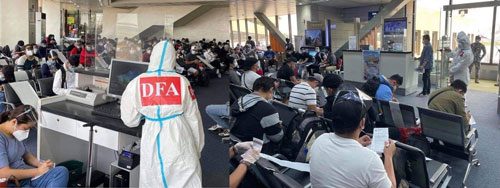The Philippines has emerged as the largest supplier of seafarers, but like the rest of those in the seafaring industry, is still confronted with the challenges of crew change.
The United Nations Conference on Trade and Development (UNCTAD) in the Review of Maritime Transport 2021 cited the Seafarers Workforce Report 2021 that said the Philippines is the top supplier of seafarers both for officers and ratings.
The Philippines has about 700,000 seafarers deployed on domestic or foreign-flagged seagoing vessels or over a quarter of all global merchant shipping crew members come from the Philippines.
As of 2019, there were 380,000 Filipino seafarers overseas. By mid-2020, over the three months after the onset of the new coronavirus disease 2019 (COVID-19) pandemic and the quarantine imposed in the country, 50,000 Filipino seafarers had been repatriated, but only 17,845 outbound or deployed seafarers were recorded by the authorities.
As overseas remittances are key source of income, the pandemic had reduced the Philippines’ earnings from its seafarers in 2020 by 2.8 percent to $6.4 billion from $6.5 billion in 2019. Last year’s seafarers remittances accounted from 21 percent of total.
But Filipino seafarers are not spared by what the UNCTAD said is worsening crew change crisis.
The latest Neptune Declaration Crew Change Indication published in July this year showed the number of seafarers on board ships beyond the expiry of their contracts continue to rise, so as the number of seafarers on board for the maximum allowable 11 months.
Those stranded are denied their rights to freedom of movement are often forced to work beyond the default 11-month maximum service on board, often resulting in forced labor.
UNCTAD raised concern over the continuing pandemic-induced crisis around crew changes, with lockdowns, border closures and lack of international flights leaving hundreds of thousands of seafarers stranded at sea, unable to be replaced or repatriated.
“The crew change crisis that resulted from the COVID-19 has left hundreds of thousands of seafarers stranded at sea long beyond their contract time, and others unable to sign up for their time at sea…urgent attention is required from flag, port and labor-supplying states, in collaboration with relevant international organizations, to end this crisis,” UNCTAD said in the report.
It added government and industry should continue to work together including through the Neptune Declaration initiative adopted by 600 companies and organizations in January 2021 calling for industry protocols such as priority access to vaccines, and ensuring air connectivity between key maritime hubs for seafarers among others. – Irma Isip.




